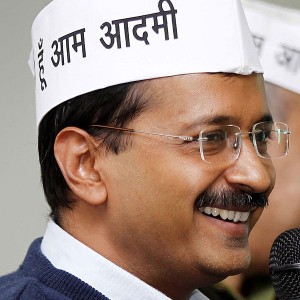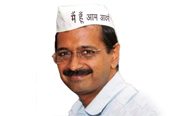Kejriwal resigns as Delhi’s CM after 49 days.
By Rajiv Theodore
 NEW DELHI: Let us see it this way. The battle is just begun and round one has been clinched by Arvind Kejriwal, the Magsaysay Award winner and the bureaucrat who quit a career to fight the raging corruption that had engulfed the country since long.
NEW DELHI: Let us see it this way. The battle is just begun and round one has been clinched by Arvind Kejriwal, the Magsaysay Award winner and the bureaucrat who quit a career to fight the raging corruption that had engulfed the country since long.
The man who stunned the nation with a victory march over the country’s oldest and most entrenched party, the Congress, with hardly any funds or propaganda, quit the Delhi government as its Chief Minister, after being at the helm for just 49 days.
Kejriwal quit because the establishment around him was scared that he would usher in the Jan Lok Pal Bill, which had the express power to expose all and sundry (read the politicians and the whole breed of bureaucrats known popularly for their corruption) if it is voted to become law.
The Lt. Governor of Delhi, Najeeb Jung, whose office was famous for being the most inactive in the city, came alive when Kejriwal wanted to usher in the bill. Jung tried to block the passage of the bill by simply coming in the way, stating that according to protocol, the Chief Minister cannot introduce a bill without his consent. And Kejriwal being Kejriwal simply called it a day.
Ever since the Kejriwal-led Aam Aadmi Party (AAM) was in power, the Congress – a rather hostile ally – and a belligerent and an equally frustrated adversary, the right wing Bharatiya Janata Party (BJP), were looking to make matters tough for the rookie politician whose single minded agenda was to dislodge all that was corrupt in the government. It included institutions like the police, the utilities, the schools and the city corporations.

It rocked the very fundamentals of these more entrenched political parties. Needless to say, these mainstream parties were in power in the past for a simple savage reason: to loot and build a corpus of funds for their personal use and a part of it for the party funds that in other words would help in bringing them back to power.
Such was the backdrop when Kejriwal came to power. He had simply taken them (the old guard) off the power loop, aided by a simple campaign to end corruption that knocked at the heart of the Bihari auto-rickshaw driver in Trilokpuri to the Punjabi businessman in Greater Kailash.
One by one, the man in a hurry tried to dismantle the vestiges of the old regime which had left a legacy of ruthless mandarins and a heartless police force running the show for their political bosses in New Delhi, where the common people or the Aam Aadmi were just adjuncts or simply voting fodder supposedly existing to lap up freebies just before election and then henceforth blind-fold their eyes until the next elections.
A highlight of Kejriwal’s brief stewardship of Delhi was when within a fortnight he faced flak over his Law Minister’s midnight raid on African nationals who were allegedly carrying out drug trafficking and soliciting customers for sex under the patronage of the Delhi police. He went on a day and night protest, defending his minister and the police inaction in front of India Gate, threatening to disrupt the Republic Day parade too.
Kejriwal will also be remembered for his order to audit Delhi’s private power companies who had been hiking bills after each cycle with impunity. These power companies which are owned by top business houses like Reliance Industries, are known to fund the coffers of both the BJP and the Congress. Opening up his battle on all fronts, Kejriwal filed an FIR against Reliance just before quitting.
Kejriwal was cheered by his myriad supporters when he announced his resignation, many hiding their anguish. Many were happy that he quit so that he could have a clear vision of the road ahead —to win the national elections, to have a say in the day to day affairs of the running of the country.
(Rajiv Theodore is India Bureau Chief, The American Bazaar.)
To contact the author, email to editor@americanbazaaronline.com



